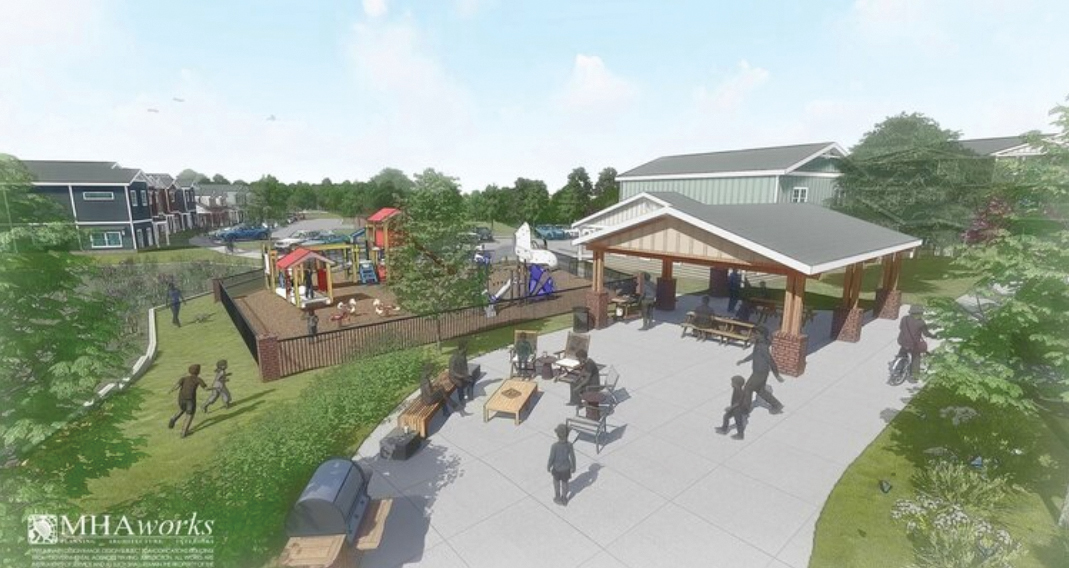
As alumni and locals are keenly aware, Chapel Hill is seemingly always growing and changing. And while there are plenty of luxury condos and townhomes planned, recently the conversation has centered on creating more affordable housing.
Last month, the Chapel Hill Town Council approved permits for the 2200 Homestead Road development following four years of deliberation. The project will bring 120 new affordable housing units, which will be a mix of apartments, condos, and duplexes for folks making anywhere from $18,000 to just over $100,000.
“Chapel Hill values being an inclusive community and, by providing land and working with our partners, we are creating a welcoming community and a special place for people to call home,” Mayor Pam Hemminger said in a press statement.
The town owns the plot of land that will be home to the new development. In 2017, town officials began seeking out a group to develop the property. Now, there’s a development team composed of the nonprofits CASA, Community Home Trust, and Habitat for Humanity of Orange County. They’re led by the Self-Help Ventures Fund, a nonprofit created by Self-Help Credit Union.
But Chapel Hill isn’t a home for everyone. Although experts advise not spending more than 30 percent of your income on housing, high land values and property taxes make it hard for everyday folks to afford housing. The average person living in Chapel Hill spends 58 percent of their income on rent, while homeowners spend a little over 22 percent on their housing. The average home in Chapel Hill costs more than $410,000 to own.
The towns of Chapel Hill and Carrboro have 1,155 public and privately-owned affordable housing units between them. However, U.S. Census data estimates that more than 13,300 people—almost 20 percent of Chapel Hill’s population and almost 16 percent of Carrboro’s—are living below the poverty level.
The town is trying to keep up with the demand for affordable housing by building more projects like the Homestead Road development. In the first six months of the 2021 fiscal year, the town completed three affordable housing developments, according to the Town of Chapel Hill’s affordable housing website. There are 15 more affordable housing developments and renovations on track to be completed anywhere from this quarter through fiscal year 2028.
In addition to the Homestead Road project, the Aura Chapel Hill, a project still in the public hearing stage, is set to include 40 affordable rental units and create affordable homeownership opportunities off the 1000 block of Martin Luther King Boulevard.
Public hearings on Aura Chapel Hill, however, have dredged up concerns from neighbors.
The Estes Neighbors webpage, seemingly connected with the Chapel Hill Alliance for a Livable Town (CHALT), has a petition to “Keep Estes Drive Moving” with 486 signatures at press time. Signatories say they want the town to reject the rezoning proposal since they presume the development would create more traffic. They’ve voiced concerns over parking and “uncertain community benefits,” while also asserting that the development would be a “net loss in revenue” for Chapel Hill.
“We’ve turned our attention to the proposed AURA[sic] development because of its disproportionate size and car-centric architecture that pose a large threat to Estes Drive mobility,” the website reads.
The town council will move to vote on the Aura development’s rezoning application on June 16, almost 16 months after the initial application was filed.
An affordable housing development on Jay Street is still in the planning stages, and its developers will present ideas to the town council later in June. Sitting right on the border of Chapel Hill and Carrboro, the Jay Street development would potentially create 50 affordable units, according to the concept plan application submitted to the town in March. The developers plan to submit a conditional zoning application in the fall.
Follow Digital Content Manager Sara Pequeño on Twitter or send an email to spequeno@indyweek.com.
Support independent local journalism. Join the INDY Press Club to help us keep fearless watchdog reporting and essential arts and culture coverage viable in the Triangle.

